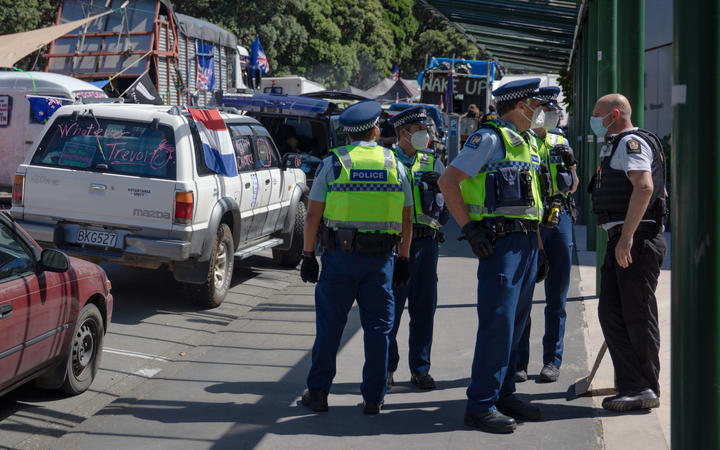Police have pulled back on their plans to begin towing vehicles illegally parked around the anti-vaccine, anti-mandate protest on Aotearoa New Zealand’s Parliament grounds.
Yesterday, police estimated more than 400 cars, vans and campervans remained ensconsed in several streets alongside Parliament.
Despite previous ultimatums, protesters showed little sign of voluntarily removing their vehicles today.
- READ MORE: Covid-19: Record 1573 daily community cases reported in New Zealand
- Texts instead of calls about positive tests will heap ‘more pressure’ on cases
- Canadian protesters end last anti-mandates blockade on US border
In a statement, police said they now had access to significantly more tow trucks to remove illegally parked vehicles but they were concentrating on engaging with protest leaders.
Police said they were exercising “careful judgement” about when to start the towing process.
“Having observed the response from protesters and noting the ongoing dynamics of similar situations overseas, police is continuing to exercise careful judgement about when to commence a towing phase,” the statement said.
“For the time being, police is continuing to focus on engagement with protest leaders with the aim of building on the initial positive responses we have seen so far.”
Police secure tow companies
Police had pulled back from an ultimatum to tow the vehicles but said they had secured commitments from companies outside the region to help if a decision was made to start the removal.
Meanwhile, Speaker of the House Trevor Mallard said, on behalf of all parties, there would be no dialogue with protestors currently occupying the Parliamentary precinct and surrounding areas until the protest returned to “one within the law, including the clearing of all illegally parked vehicles blocking streets, the removal of unauthorised structures, and the cessation of the intimidation of Wellingtonians”.

National Recovery Alliance — a group of seven Auckland towing companies — spokesperson Chris Ratcliffe told RNZ Morning Report that if police contacted towing companies across the country it was possible they could get up to 20 tow trucks.
He said police would need every one of those tow trucks to clear the hundreds of vehicles in a timely manner.
“Broadly speaking, a good operator in a good truck in a towaway environment might be able to tow one car every 30 minutes.
“Assuming that they are able to operate unimpeded roughly 20 trucks could probably clear 400 vehicles within a day or so, and that doesn’t really take into account the heavy vehicles.
“It depends how many people they are able to get involved.”
No job on such large scale
Ratcliffe had not experienced a job of that sort of scale before.
The government has today also activated its top level national security group – made up of chief executives of government agencies which provide co-ordination on national security.
Prime Minister Jacinda Ardern said it was not unusual for the group to meet, as they did today.
“To give context it’s agencies coming together, so that’s happened at an agency level at the request of the New Zealand police because there are multiple agencies that are affected by the protest — the courts for instance sit opposite Parliament and have been affected.”
‘The law has failed,’ say Christchurch residents
Meanwhile in Christchurch, residents are irate with the council’s lack of action in moving on protesters who have set up camp in Cranmer Square.
Anti-Covid-19 vaccine mandate protesters have erected tents, gazebos, caravans and portaloos in the central park since Monday, but the square has been a regular meeting place of Destiny Church and the Freedom and Rights Coalition for months.
Despite residents’ efforts to notify the council of their concerns, Christchurch City Council and police said they were only monitoring the situation as of yet.
Due to safety concerns, the council said it would only send staff to the square if they were accompanied by a police presence.
A resident said a neighbour had rung them crying, distraught over the lack of local authority action.
Another resident believed the law had failed them.
They said they had talked to the council about the protesters in the past, without any success.
“The council said it has not been able to send staff to the park because they were concerned for their safety and said they would only attend with police protection.
“But the police are only monitoring the situation, so nothing happens.”
Picton protesters refuse to vacate park
Today, a group of protesters entrenched in Picton’s Nelson Square Reserve — numbering in the hundreds — continued to camp out in the park, despite the Marlborough District Council’s request to vacate the area by 5pm yesterday.
Marlborough’s Mayor John Leggett said Picton had been patient with protesters occupying the park, but it was now time for them to leave.
“We have attempted a conciliatory approach, the occupiers have backtracked on that agreement. We have to move to a stage of serving trespass notices,” Leggett told Morning Report.
“The enforcement part of the process will rest with the police. We’ve been working very closely with them, they are aware of our position.”
Police said they would continue to monitor the situation.
This article is republished under a community partnership agreement with RNZ.
This post was originally published on Asia Pacific Report.
